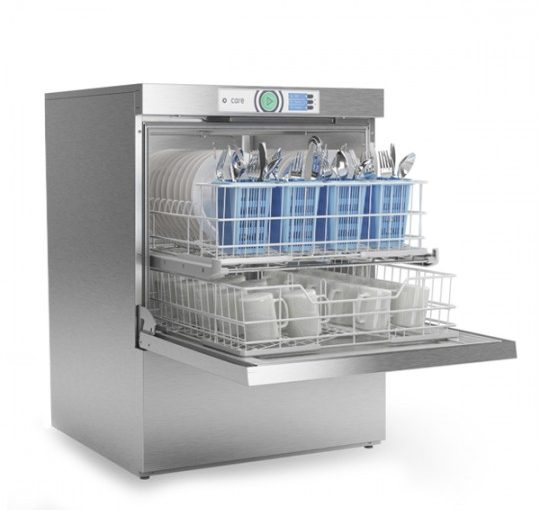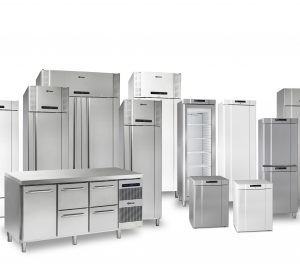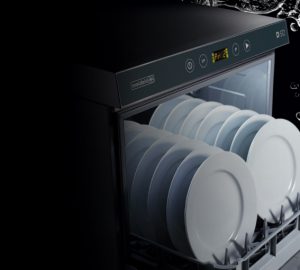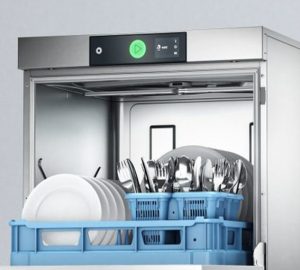Purchasing a warewasher can be a tricky decision, with dozens of brands, different types of units and specs and what can ultimately be a large spend, some of us can be left with a foggy head! To solve all your glasswasher and dishwasher problems Team Eco have put together a handy guide to help you choose the best warewasher for your business!
1. Finding the type of warewasher for you
Firstly, establish what you need to wash. Each venue has different plates, cups, glasses, cutlery, pots and pans and in varying volumes. This will help establish the type of machine you require, a glasswasher, dishwasher or utensil washer.
A few examples:
- For mostly glassware and the occasional cup and saucer, a glasswasher is best suited
- For washing cutlery and crockery, an undercounter dishwasher or pass through (hood dishwasher) is best suited
- For large venues such as airports or hospitals, a rack dishwasher or bespoke flight dishwasher
- For pots, pans and trays at volume a utensil washer is perfect
2. Throughput and Performance
The warewasher must be able to handle your throughput. If you are a busy site serving hundreds of meals a day, you will need a machine capable of high volume washing. Too small and the warewasher will be overworked, too large and it could be wasted expenditure and underused. Manufacturers supply performance figures giving you an idea of their capabilities. And remember at Eco Catering we are more than happy to give you help and guidance to find the best suited machine.
3. Space and installation
Crucially, the machine has got to fit. Finding the perfect warewasher that doesn’t sit under your counter or a hood dishwasher that is too tall for your ceiling isn’t going to be a lot of use. To use a hood dishwasher, and for the machine to be used effectively, you will need a prewash sink and cleans table. Measure your space available. Tabling comes in various sizes to fit your layout or can be fabricated to fit.
Check your site services, water in, waste out and electrics. This again will help steer your decision. A 3-phase hood dishwasher, if you only have a 1-phase supply, isn’t going to work. An upgrade to your services may be required or a warewasher specified to work with what you have got. Establish your services and their location early on. If it’s a new project you can make sure you put the correct services in place at the very beginning.
4. Water Softener
Most of the UK has hard water. Check your water type with your supplier. If you have hard water you must protect your warewasher from limescale damage. Warewashers in hard water areas are prone to limescale build up, which can cause irreversible damage. By purchasing a water softener, whether it be in-built or external, will prevent limescale build up, guarantee consistent wash results and prolong the life of your warewasher. If you are one of the lucky ones and have a soft supply you can ignore this point.
5. Easy to use
Select a unit that is easy to use. We know staff time is crucial and staff turnover can be quite high in the hospitality industry. An easy to use machine reduces precious staff time, training and the potential for damage through misuse. As an example, Hobart’s undercounter GX and FX units come with a single button to turn the machine on, start the wash and turn the machine off again. Their models with in-built softeners have a warning light telling you when it needs topping up with salt. It couldn’t be easier. To see our video on the Ecomax and Ecomax Plus control panel click here.
6. Cleaning
Cleaning is an essential yet dreaded task of any daily routine in the food and beverage industry. Consider what is required to empty and clean the machine down. Well considered warewashing units are designed for ease of cleaning. For example, the Hobart Ecomax range incorporates a drain down button, automating the process, this also rinses the unit out to make your manual cleaning less time consuming. The chamber has pressed interior with smooth corners eliminating dirt traps, making wiping down the unit quick and simple.
7. Energy consumption
Due to the nature of dishwashers and the fact they are often on all day, warewashers have the potential to consume a lot of energy. A Carbon Trust analysis estimated that 85% of the lifetime costs of owning catering equipment is its energy consumption. With an estimated 30% rise in energy costs by 2020, it is essential you choose a machine that is efficient. Warewashing technology is ever evolving and developing, to help improve your savings. With your dishwasher potentially being on all day, every day, even the smallest cost saving can be substantial when you consider those savings over the weeks, months and eventually years.
8. Maintenance
A well-maintained glasswasher and dishwasher will perform at their optimum and give you the maximum lifespan. A poorly maintained warewasher, no matter how expensive, well specified or well-built will not perform if it’s neglected. We would always recommend a machine that is well supported with service support and parts readily available. Make sure you establish your own clean down program and consider a service schedule from a qualified service engineer.
9. Warranty
Most manufacturers will supply a warranty, if this is not the case, personally, we would suggest considering an alternative brand. If not then at least purchase an extra warranty. A full warranty will cover you for unseen problems in the future that may cost you should the worst happen. And remember, most manufacturers offer extended warranties. Well worth considering if you have a busy site or want that peace of mind with no surprise repair bills.
10. Cheapest is not always best
It’s understandable to want to save your pennies when investing in new equipment, reducing the upfront cost of a warewasher makes sense, doesn’t it? Consider this, to save on production costs the units must have either reduced the specification or be built to a price point. Think about what features are or aren’t necessary for your establishment. A poorly specified machine will be far costlier in the long term if it cannot do what you need. Cheaper machines will tend to have a shorter lifespan and are generally less energy efficient. You could save up front, but may pay more on energy bills and maintenance costs over the life of the machine.
We hope this gives a few points to consider and makes the buying journey a little easier. And remember, we are here to help. If you need any more help to choose your dishwasher or glasswasher, contact one of our team members, we’ll be only too happy to help.
01582-865050
Or to view our full range of warewashers click here



